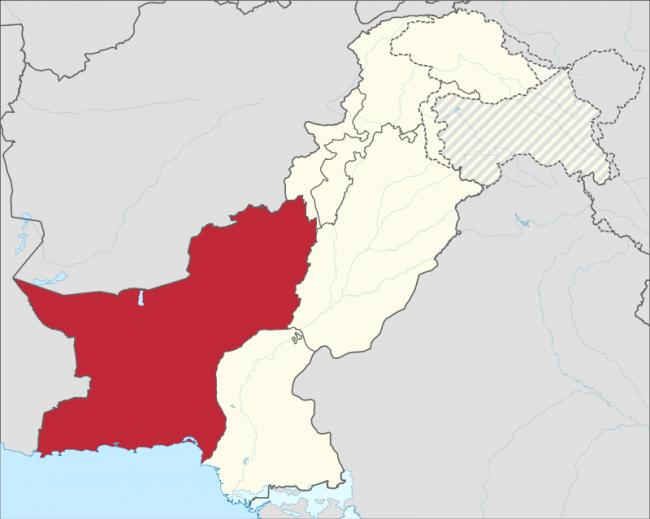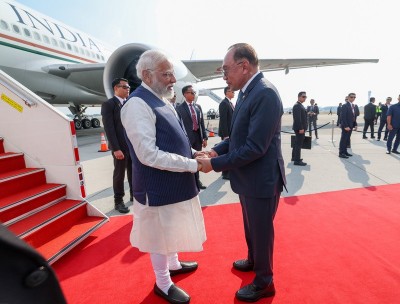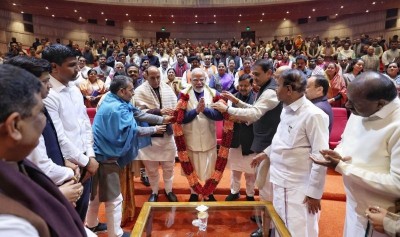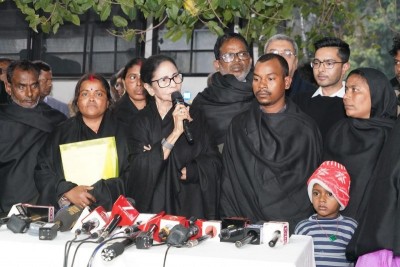
Balochistan: Enduring Tragedy
BLF 'spokesman' Goran Baloch claimed responsibility for the attack, asserting, "We will continue our fight against Pakistani occupation until (the) liberation of Balochistan."
Retaliating to the killing, the Frontier Corps killed at least 13 BLF militants in a raid on April 13, 2015, including one key militant 'commander' Hayat Bewas in the same area. Leveling charges of extrajudicial killing on the SFs, leader of the Voice for Baloch Missing Persons (VBMP) Abdul Qadeer Baloch, also known as Mama Qadeer, at a Press Conference at the Karachi Press Club in Karachi, on April 16, 2015, claimed that five of the 13 suspects killed had been missing for some time. The claim leaves the incident shrouded in controversy. As SAIR has noted in the past, extrajudicial killings by state agencies have become a recurring problem in the Province.
The April 10 killing was the first incident of ethnic violence in Balochistan in 2015. There are, however, other precedents in the Province, such as the October 19, 2014, incident in which at least nine Punjabi poultry farm labourers were found dead in the Sakran area of Hub tehsil (revenue unit) in Lasbela District. Unidentified militants had abducted the 11 workers from a poultry farm in Sakran on October 18, 2015, and had killed nine of them after checking their identity cards. The remaining two were set free because they were from the Lasbela District of Balochistan. The United Baloch Front (UBF) had claimed responsibility for the October 2014 killings.
In another such incident, at least two persons were killed and a child was injured when unidentified militants opened fire at a barber shop on Sariab Road in the provincial capital Quetta, on April 15, 2014. Superintendent of Police (SP) Imran Qureshi had disclosed that the victims belonged to Punjab and had been working on Sariab Road for a long time.
Some other major attacks (each resulting in three or more fatalities) inside Balochistan targeting settlers from outside Balochistan include:
August 6, 2013: At least 14 Punjabis, including three security personnel, were killed in an attack by Baloch Liberation Army (BLA) militants on five passenger buses in the Machh area of Bolan District. The buses were on their way from Quetta to Punjab when 200 militants intercepted them in Machh and abducted the passengers. The militants killed Punjabi passengers after inspecting their national identity cards (NICs).
July 6, 2012: At least 18 Punjabi-speaking persons, who were travelling to Iran, were shot dead and another two were injured, when Balochistan Liberation Tigers (BLT) militants attacked their vehicles in the Basoli area of Turbat District.
July 23, 2011: Five labourers of Punjabi ethnicity were shot dead by unidentified assailants in the Kisankuri area of Nushki town in Nushki District.
August 14, 2010: Unidentified assailants singled out Punjabi passengers travelling on a bus, killing 10 and injuring five near Ahd-e-Gham in Mach town, Bolan District.
According to partial data compiled by the South Asia Terrorism Portal (SATP), a total of 159 settlers have been killed in Balochistan since the killing of Nawab Akbar Bugti, leader of the Bugti tribe and President of the Jamhoori Watan Party (JWP), on August 26, 2006, in a military operation in the Chalgri area of the Bhamboor Hills in Dera Bugti District. The killings of settlers started only after the Bugti killing, when Baloch militant organizations such as the BLA, BLF and Baloch Republican Army (BRA), among others, began to voice anti-Punjabi sentiments in their slogans. The killing of Akbar Bugti led to a series of attacks on Punjabi and other non-Baloch settlers in Balochistan, as well as the destruction of national infrastructure.
Out of the 159 'outsiders' killed, at least 146 were Punjabis. 33 Punjabi settlers have already been killed in the current year (data till April 19, 2015). In 2014, the number of such fatalities stood at a total of 17; in 2013, at 29; 2012, at 26; 2011, at 13; 2010, at 21; 2009, at 18; and one in 2008. No such fatality was recorded in 2007 and 2006. While Punjabis have been the main targets, other ethnic groups, like Urdu-speaking people from Karachi and Hindko-speaking settlers from Haripur District in Khyber Pakhtunkhwa (KP), have also been singled out in acts of ethnic violence. A media report published on June 28, 2011, noted, "Almost all non-Baloch are on their hit-list." Muhammad Khalid of Balochistan Punjabi Ittehad stated, "The militants began to target the Punjabi settlers after Nawab Bugti was taken out by the military (in August, 2006). Before that there were occasional incidents in which Punjabis were targeted."
Most of the Punjabi settler killings are recorded in South Balochistan (principally in Bolan, Turbat, Gwadar, Panjgur, Khuzdar, Sibi and Lasbela Districts) which accounts for 122 killings; followed by 24 in North Balochistan (mostly in Nushki, Quetta and Mustang District). The overwhelming concentration of such killings in the South is because of the presence and dominance of Baloch insurgent groups, while the North isdominated by Islamist extremist formations such as the Tehreek-e-Taliban Pakistan (TTP) and Lashkar-e-Jhangvi (LeJ), who are primarily engaged in sectarian killings. The latter groups of Islamist terrorist formations enjoy the tacit support of Islamabad, which has, for long, used Islamist extremist violence as an instrument of domestic political management, engaged in a selective campaign against the Baloch people, and sought to aggressively alter the region's demography
Targeted killings have now created an atmosphere of fear and terror among settlers across the Province. According to the a report by the Human Rights Commission of Pakistan (HRCP) dated October 15, 2014, more than 300,000 people have fled the Province over the past 10 years due to the growing unrest. Tahir Hussain Khan, President of the Balochistan Chapter of the independent HRCP asserted that 90,000 people who had fled were from Punjabi and Urdu-speaking communities, and had left to avoid violence by Baloch nationalists.
An unnamed Punjabi-speaking member of the Barbershop Owners' Association in Quetta, way back on August 23, 2007, demanded that the Government provide them security as they were facing threats due to their ethnic background, and had claimed, "Since Nawab Akbar Bugti's killing last year, more than 12 attacks have been made on barbershops. The number of attacks in interior Balochistan is higher."
Of the 3,367 civilian fatalities recorded in Balochistan since 2004 [data till April 19, 2015], at least 837 civilian killings are attributable to one or other militant outfit. Of these, 325 civilian killings (202 in the South and 123 in the North) have been claimed by Baloch separatist formations while the Islamist and sectarian extremist formations, primarily LeJ, TTP and Ahrar-ul-Hind (Liberators of India), claimed responsibility for another 512 civilian killings, 506 in the North (mostly in and around Quetta) and six in the South. The 325 civilian killings attributed to Baloch formations include at least 146 Punjabi settlers since 2006. The remaining 2,530 civilian fatalities - 1,535 in the South and 995 in the North - remain 'unattributed'. A large proportion of the 'unattributed' fatalities, particularly in the Southern region, are believed to be the result of enforced disappearances carried out by state agencies, or by their proxies, prominently including the Tehreek-e-Nafaz-e-Aman Balochistan (TNAB, Movement for the Restoration of Peace, Balochistan). The large number of unattributed civilian fatalities strengthens the widespread conviction that the Security Agencies are busy with "kill and dump" operations against local Baloch dissidents, a reality that Pakistan's Supreme Court hasclearly recognized.
In a demonstration of Islamabad's belligerent strategy on the Baloch crisis, unnamed official sources revealed that Prime Minister Nawaz Sharif, during his meeting with Army Chief General Raheel Sharif on April 15, 2015, decided to expand the ongoing Operation Zarb-e-Azb to Balochistan, to target the Baloch insurgents. The Army launched Operation Zarb-e-Azb against terrorists of the Tehrik-e-Taliban Pakistan (TTP) and associated Islamist terrorist formations in the North Waziristan Agency of the Federally Administered Tribal Areas (FATA) on June 15, 2014, in the aftermath of the attack on the Jinnah International Airport, Karachi, on June 8-9, 2014. The Army, thus far, has claimed to have killed 2,000 'terrorists' (no independent confirmation of this categorization is available, as media and outside access to the areas of conflict is severely restricted) in the ongoing Operation.
Baloch separatists allege that the Federal Government is systematically suppressing development in Balochistan to keep the Baloch people weak. The attacks on Punjabi settlers are claimed as retaliation by the Baloch people against the Pakistani establishment's efforts to alter the region's demography, and for continuously ignoring the genuine grievances of the Baloch people. One of these grievances, as evident from the recent killings of workers, is the outsourcing of labour from other Provinces, deliberately keeping the local Baloch away from development work in the Province and depriving them of their own resources.
Further compounding ethnically targeted violence is Islamabad's strategy of supporting armed Islamist extremist formations and other violent proxies that have enormously worsened the situation in Balochistan. Turning a blind eye to the ground realities of the Province, the Federal and Provincial Governments have remained complicit in the State-backed repression of Baloch groups articulating the genuine demands of the community. The most basic issues, including the urgent crisis of extra judicial killings, have been studiously ignored by authorities, and judicial proceedings have been actively thwarted to prevent effective prosecution of the guilty. Under the circumstances, the possibility of relief to the people of Balochistan - both locals and 'outsiders' - remains slim.
Support Our Journalism
We cannot do without you.. your contribution supports unbiased journalism
IBNS is not driven by any ism- not wokeism, not racism, not skewed secularism, not hyper right-wing or left liberal ideals, nor by any hardline religious beliefs or hyper nationalism. We want to serve you good old objective news, as they are. We do not judge or preach. We let people decide for themselves. We only try to present factual and well-sourced news.







